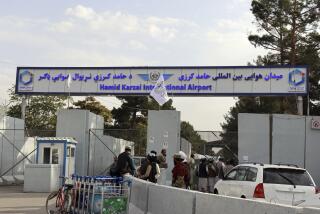4-Day Hijacking of Afghan Airliner Ends Peacefully
- Share via
LONDON — The four-day hijacking of an Afghan jetliner ended peacefully today when the gunmen released all of about 150 hostages in two groups before dawn at Stansted Airport northeast of here.
About 85 people holding their hands over their heads began filing out of the plane around 3 a.m.
A couple of hours later, the rest of the hostages left the aircraft.
“I believe the hijacking is now at an end,” said Joe Edwards, assistant chief constable of Essex police. He said police would start the process of identifying hostages and hostage-takers.
“We need to ensure that the airplane is safe to enter,” he said.
The hijackers commandeered the Ariana Airlines Boeing 727 on Sunday, shortly after takeoff from Kabul, the capital of Afghanistan.
The passengers began leaving the plane today about an hour after two of the hijackers were seen descending the aft stairs of the jet, picking up something from the tarmac and then returning aboard, pulling the steps up behind them.
Edwards said that “face-to-face” encounter helped bring the hijacking to an end.
“We’ve worked hard to build on trust” with the hijackers, he said.
Marksmen and other camouflaged security forces, including Britain’s elite SAS soldiers, were posted near the hijacked plane throughout the ordeal but never moved in.
The demands of the hijackers still had not been released, but there was increasing speculation Wednesday that they would seek asylum for themselves and suspected family members aboard the aircraft. They apparently did not make political demands of the radical Islamic Taliban government back home as first believed.
The British media reported Wednesday that three of the nine hostages freed earlier by the hijackers in London have already claimed political asylum in Britain. The Home Office refused to comment on the reports.
The asylum motive was reinforced by the presence at Stansted of an observer with the U.N. refugee agency and by a report in the Times of London that the gunmen have been promised that they will not be sent back to Kabul to face the Taliban regime, which almost certainly would execute them.
Police have indicated that they are not dealing with sophisticated hijackers, experienced in such complex operations. They said the hijackers, believed to number between six and 10, have demanded little more than food and supplies.
“No specific demands beyond housekeeping requirements have been made, incredible as that may seem,” said John Broughton, assistant chief constable of Essex police.
But news reports Wednesday from Afghanistan suggested that about 40 members of a single clan who were supposedly headed for a wedding in Mazar-i-Sharif in northern Afghanistan could be involved in the hijacking.
The plane never landed in Mazar-i-Sharif but stopped off in Uzbekistan, Kazakhstan and Russia, releasing about 20 people, before arriving at Stansted on Monday.
The captain and three crew members who on Tuesday escaped through a cockpit window were criticized Wednesday by fellow pilots and aviation experts who accused them of abandoning ship.
The members of the flight crew who escaped reportedly told officials that the hijackers seemed eager to resolve the 4-day-old siege and that the gunmen had family members--possibly dozens--among the people still on the plane.
Police said that the breakout had an “adverse effect” on negotiations with the hijackers but that they managed to reestablish a rapport with the gunmen and restore calm.
Airline officials and pilots associations were reluctant to discuss standard procedures for pilots and crew during a hijacking, saying that such security information could serve air pirates in the future.
But Chris Yates, an aviation security expert with Jane’s Transport, told BBC television that the Afghan pilots had a “moral obligation” to stay on board.
“The pilot is the legal authority on board the aircraft from the moment passengers embark to the moment they disembark,” Yates said. “He has legal responsibility for the well-being of his passengers. Most pilots would stay with their passengers whatever the cost.”
Contributors to the Professional Pilots Rumour Network (https://www.pprune.org), an Internet chat line, concurred.
“Isn’t the captain supposed to go down with the ship? Or do we get paid to be trained for such situations for no real reason?” one contributor asked.
“I can understand self-preservation kicking in, but I think they have a responsibility to the passengers they seem to have forgotten about,” wrote another.
The last group to hijack a plane to Britain consisted of six Iraqis fleeing Saddam Hussein’s regime in 1996. They served brief jail terms but were released after an appeals court cleared them on technical grounds. They claimed asylum and live in London, drawing state benefits and legal aid until their case is decided.
More to Read
Sign up for Essential California
The most important California stories and recommendations in your inbox every morning.
You may occasionally receive promotional content from the Los Angeles Times.













